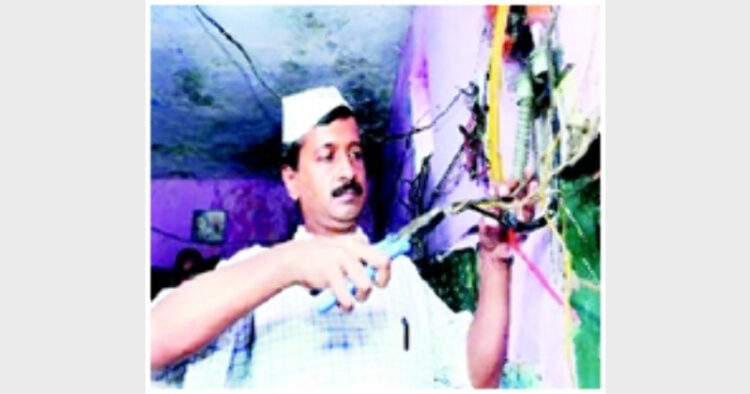Ashish Joshi
ANTI-Corruption crusader Arvind Kejriwal has launched his ‘bijli-paani satyagraha’ by urging Delhiites not to pay their electricity and water bills, by publicly burning copies of power bills, and by restoring the electricity connection of two households whose electricity had been cut off due to non-payment of bills. This is not the first time that someone has protested against the way electricity distribution has been mismanaged across the city, and certainly, it won’t be the last.
Delhi has always had a problem with electricity generation. It is common knowledge that Delhi produces only a fraction of electricity that it requires and is dependent on other states for surplus power. For long there had been talk about privatising Delhi’s electricity supply; ironically, once this was done, the capital’s electricity woes only intensified. People began getting humongous bills; complaints began to pour thick and fast of faulty meters that were wired to run fast so the corrupt and inefficient electricity firms could earn profit. Vivek, a driver who works in an office, for instance, received a bill of five thousand rupees, when his average bills never exceeded eight hundred rupees!
On June 26 this year, the Delhi government announced a steep 26 per cent hike in domestic tariff for consumers. The reason given was increasing input costs and a spiraling debt that had the electricity firms over a barrel. More than ten years have passed since the Delhi Vidyut Board (DVB) privatised transmission and distribution of power to tackle issues of load shedding, power shortages, poor electricity supply and increasing transmission and distribution losses. A media investigation showed that though the power firms have managed to minimise power theft, it has not benefited consumers. In 2002, for instance, almost 55 per cent of power was stolen; this has come down to 18 per cent in 2012. But this hasn’t translated into any gain for the consumers.
Though distribution companies say they have reduced power cuts from 2.29 per cent in 2002 to 0.30 per cent in 2012, the reality is that power woes continue to debilitate several areas in Delhi like Ashram, Najafgarh and parts of East Delhi, where the situation is as bad as it was a decade ago. Sample this: between 2002 and 2012, Delhi has managed to add a measly 52 megawatts (MW) to its generation capacity, from 995 MW to 1047 MW while during the same period, the power demand skyrocketed from 2879 MW to 5500 MW. Delhi has been lucky in that it has been able to tide over the shortfall in supply through power supply agreements with other states and firms like Damodar Valley Corporation (DVC). But these independent power firms often threaten to cut off Delhi’s electricity supply as Delhi power distribution, for instance, the corrupt BSES Rajdhani, owes them over 200 crore rupees in unpaid dues.
Meanwhile, Arvind Kejriwal’s initiative, has earned the ire of Delhi power minister Haroon Yusuf, who said he would get Kejriwal arrested for his acts, which are tantamount to breaking the law. “Kejriwal is trying to spread anarchy and lawlessness in the city. He does not believe in law and order. We will not allow him to succeed. Legal action must be taken against Kejriwal for his illegal act and instigating people to do so,” Yusuf said. He also exhorted citizens to uphold the rule of law and to register their complaints with bodies, such as the Delhi Electricity Regulatory Commission (DERC), if they have any.
Meanwhile, the BJP is continuing its Bijli Andolan against hiked power tariff in the capital. Dr. Harsh Vardhan, the former Delhi health minister, said the BJP has always been in the forefront of social activism; he commented that the BJP has organised protests in Parliament, at Jantar Mantar, and even outside politicians’ homes. “Two years ago, we organised a big protest outside the DERC offices protesting against unfair tariff prices, which went on for fourteen days,” he explained. He said the BJP would continue its protests till the electricity firms roll back the unfair hike or till the government goes. He remained dubious about Arvind Kejriwal’s ability to bring about any difference regarding the power tariff issue and called it a gimmick. Kejriwal has joined hands with the BJP to protest against the powerful electricity mafia who call the shots in the national capital. It was in fact BJP’s Nand Kishore Garg, who was the first to move court when the Delhi government cocked a snook at the DERC recommendations.
Though the BJP has been agitating against the issue of unfair power tariff for close on two years, it is only recently when Kejriwal jumped into the fray that the movement has attracted a wider media audience-and interest from the apathetic middle classes. Suddenly, Kejriwal finds himself catapulted into the limelight and gracing the front pages of almost all major dailies. Is this the issue that might fuel Kejriwal’s unbridled political ambitions and lead him into the forefront-perhaps as a chief ministerial candidate? Only time will be an answer to that.














Comments